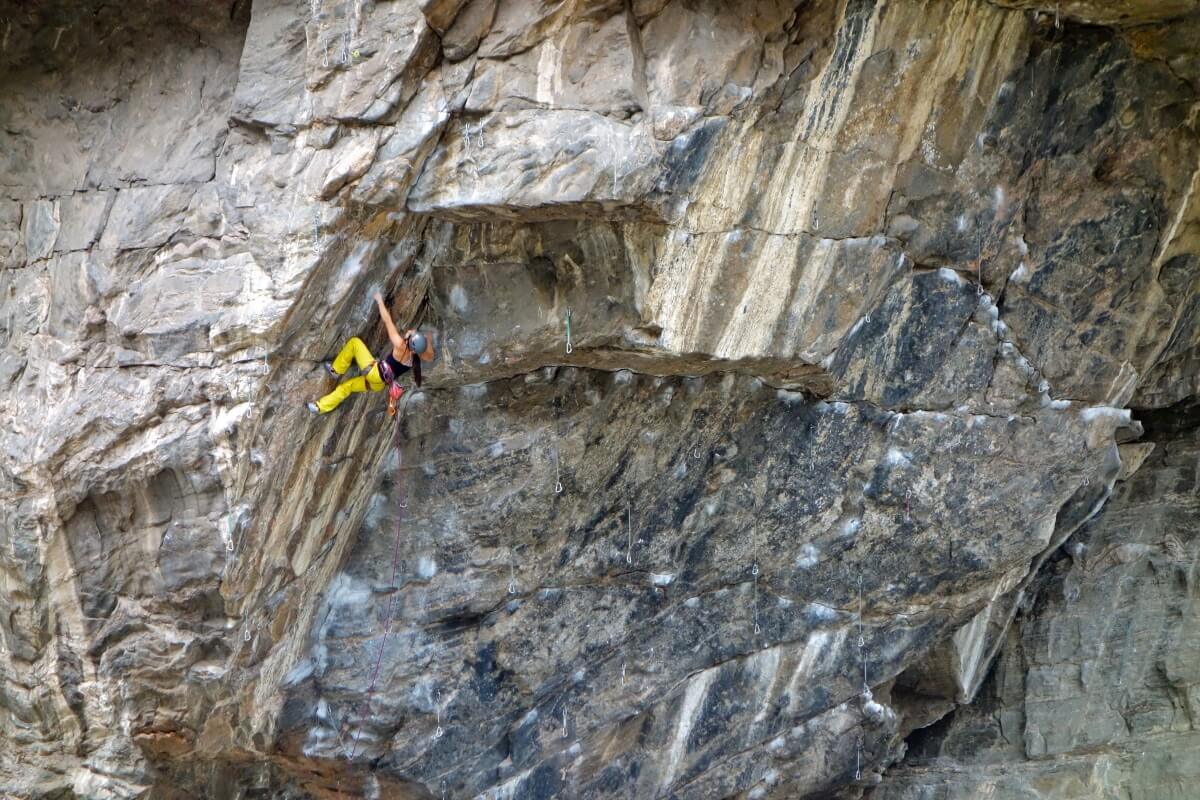Forbes Cone, CA’s Director of Experiential Education Program and coach of CA’s Climbing Team, talks to accomplished CA student climber Alena Holbert. Holbert is a sophomore, and last summer she took first place for her age group in both sport and speed climbing at the USA Sport and Speed Climbing Mountain Division competition, a division that includes Montana, Wyoming, Colorado, Utah and Idaho. She went on to compete in the USA Sport and Speed Youth Nationals in sport climbing, where she advanced to the semi-finals and subsequently placed 18th . She continues to compete this year on CA’s climbing team.
How did you first get into the sport of climbing?
My elementary school had a wall, so we climbed twice a year, but about 4 years ago, my mom was sick of seeing me sit on the couch all summer. So she told me that I needed to choose a sport, and I joined the Rock’n and Jam’n [climbing gym] team. At first, I was only climbing once a week, and then it turned into the JV about a year later, and then I progressed to varsity at the beginning of 2014.
What do you consider your greatest strength as a climber?
I read routes really well and am a good competitor. I have playbook moves in my mind, which help me to anticipate the movement once I hop onto the wall. Through a few years of competition experience, my approach, visualization, and mental training has improved to the point where I can somewhat relax and have fun.
Falling used to be scary, but I’ve overcome that fear, which was holding me back. I used to give up, but now I go for it, and I can tell the difference between a token effort, and real effort.
What’s your proudest climbing accomplishment?
Qualifying for Nationals in both disciplines, bouldering and ropes, where I placed 19th and 18th respectively. I am also proud of sending Sonic Youth, in Clear Creek Canyon (5.13a), but Debaser, in Rifle Mountain Park (5.12d) feels like more of an accomplishment, even though it’s technically easier. I started trying it in August. Every month since, I drove 4 hours to western Colorado to climb the route. I fell many, many times, and got incredibly frustrated, but I finally finished it at the beginning of October.
Where do you see yourself in 4 years?
Competing. I’d like to make the USA Olympic team and compete in Japan in 2020. Long term, I’d like to compete as adult and continue to compete in the World Cup series. Even though traditional and ice climbing seem scary, I’d like to give these a try sometime down the line.
Maybe even some multi-pitch climbing?
Which climber do you admire? Why? I admire Ashima Shiraishi, because she is REALLY strong, my age and is arguably the best female competitor in the world. Also, she is really nice and humble. When she finishes a route she waves at the crowd. It’s not a gesture of arrogance, it’s an expression of genuine enjoyment and joy.
How do you keep things in perspective?
I am still relatively new to climbing, so I try to give myself a break, do my best not to care about the outcome, and stay present in the process. The outcome is so dependent on other competitors and their performance, and I can only control myself: my effort, focus, and determination.
What makes climbing unique?
The mental preparation and problem-solving aspect of the sport. It’s always different because you’re faced with a problem that you’ve never seen before. You cannot memorize the moves; instead, you have to draw on all of your earlier experience to succeed in the present moment.
Tell me about your training and coaching schedule.
I train with the Rock’n & Jam’n team three days a week, for three hours, and try to get outside as much as possible. I coach the prep team, kids who are 11 years old and younger, once per week, on Thursdays. During these practices, I give them recognition, acknowledge they’re getting better, and hope to inspire a love for the sport of climbing. I rarely tell them what they can do better; at this stage, it’s more important to give kids praise and let them learn to figure it out on their own, so I only occasionally give advice.
What has climbing taught you?
Probably the most important thing that I’ve learned is being okay with discomfort. It’s scary, it’s hard, it’s frustrating, and it’s important to know how to handle yourself in those situations. Additionally, I’ve learned a lot from training with a team. As true with life, there are always people whom you don’t get along with. It’s important to know how to interact with them and still be friendly. Whether it be steering clear of hot topics, or even just sitting down and talking with them, I’ve learned that I can’t just make it go away. I have a part in it too, and it’s important that I keep up my side of the street. I remind myself that everyone has redeeming qualities, and no one really wants to be the mean one.
